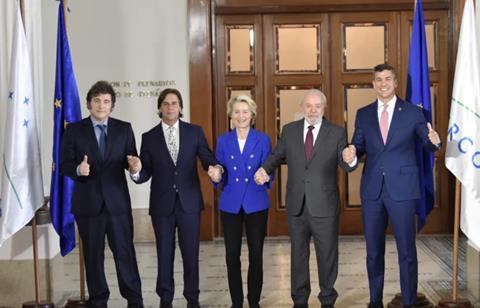The agreement is positive for fruit and vegetables –provided the fine print can be carefully negotiated
This story began almost 30 years ago, with the signing in 1995 of the European Union-Mercosur Interregional Framework Agreement for Cooperation. Formal negotiations to seek a trade agreement got underway in 2012, and in 2019 an Agreement in Principle was reached. At the time, this was described as historic by both parties because it went far beyond tariff issues and contemplated implications for deforestation and other environmental aspects in the different Mercosur countries, especially Brazil.

Finally, on 6 December in Montevideo, the agreement was signed by the president of the European Union, Ursula von der Leyen, and presidents Lula da Silva of Brazil, Santiago Peña of Paraguay, Javier Milei of Argentina; and the outgoing president of Uruguay, Luis Lacalle Pou, who was accompanied by the incoming president Yamandú Orsi.
But it is clear that the path to the agreement is going to be long and complicated. France’s opposition is frontal and absolute – the entire French countryside supports its government, whatever its colour, in opposing the deal.
The controversy erupted recently when the president of Carrefour, Alexander Bompard, banned Mercosur meat from French shops, and was subsequently forced to back down. Never mind that it is public knowledge that French meat is fed with Brazilian soya. Poland seems to be heading in the same direction as France; Italy, or at least its agriculture minister, is also opposed, although its position as a country is uncertain.
Copa-Cogeca, which brings together agricultural unions and cooperatives from all over the European Union, has cast doubts on the real capacity of Mercosur governments to comply with the agreements on improvements in production and respect for the environment.
In general, so far there are more voices against the agreement than in favour of it. On the other hand, industry in general, and the car industry in particular, is silent because it is generally in agreement with working towards the creation of a free trade zone of more than 700mn inhabitants, and therefore consumers, on both sides of the Atlantic.
And the geopolitical assessments that encompass many other aspects of the macroeconomy say that it is important to tilt Mercosur towards Europe, rather than allowing it to remain tied to the dollar or fall into China’s net.
In this piece I am limiting myself to commenting on the current situation regarding the EU and Mercosur’s commercial ties with regard to fresh fruit and vegetables over the last decade.
Imports from Mercosur are stable, but exports from the European Union are falling. We are not doing well. EU imports are led by Brazil with mangoes, melons and citrus; followed by Argentina, essentially with citrus; Uruguay, again with citrus, and Paraguay is not relevant.
In the case of mangoes, production is typically found in the tropical areas of Brazil, while in citrus and melons, the different location of the four countries in the Southern Hemisphere gives them a semblance of intrinsic complementarity with European production.
In terms of EU exports to Mercosur, in 2023 Italy led with apples (44,373 tonnes) and kiwifruit (11,138 tonnes); followed by Spain with apples (8,468 tonnes), pears (5,747 tonnes), citrus (14,850 tonnes), plums (15,135 tonnes), onions (4,101 tonnes) and garlic (1,189 tonnes); and Portugal with apples (20,451 tonnes), pears (16,591 tonnes) and plums (1,527 tonnes). Greece and the Netherlands close the list of relevant exports with kiwifruit (4,469 tonnes) and onions (4,059 tonnes) respectively.
Until now, these exports were subject to a baseline tariff of 10 per cent. In addition, other phytosanitary issues have occasionally sprung up and complicated exports, such as when three seasons ago plum exports were halted without any scientific basis.
In the case of Brazil, there are some draconian export protocols in place which could disappear if the fine print of the agreement is well negotiated. This would be very positive for all EU produce exports.
Perhaps more consequential has been the signing of an agreement between Mercosur and Egypt, which currently does not pay customs duties on its oranges. As a result, Spain has gone from exporting 20,000 tonnes of oranges in 2019 to just 8,500 tonnes in 2023. During that same period, Brazilian citrus exports to the EU have gone from zero to 9,800 tonnes.
It’s clear that in processed products – and citrus in particular – the deal could affect us negatively. Brazil is the world’s leading producer of orange juice, which today pays a tariff of 12.2 per cent to enter the EU, but could see this disappear in a few years. However, things are worse with Egypt, which has no tariff for either its fresh oranges or its juices, if and when it starts producing them.
On the other hand, for oil and wine, the agreement will certainly be positive for the EU and the market is very interesting.
It’s clear that if we analyse the agreement exclusively from the perspective of fresh fruit and vegetables – and in particular, apples and pears, kiwifruit, citrus, stonefruit, onions and garlic – one must conclude that the agreement is positive.
But it is equally evident that fresh fruit and vegetable production doesn’t carry much weight in Brussels, and it will not be easy for our voices to be taken into account in the upcoming negotiation battle.
Nevertheless, from an ideological point of view, I have to confess that I am an absolute defender of free trade, as long as it is reciprocal in every sense. And from that personal point of view, I agree with the phrase of my friend Tomás Gracia Azcárate: “My opinion is that an agreement between Europe and Mercosur could be a globally positive agreement for both economies, and more importantly, for both populations. But things have to be done right.”



